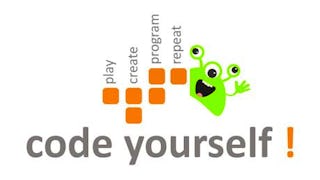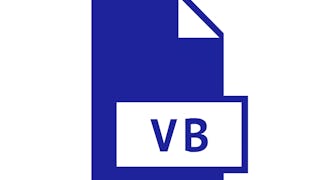This course offers a comprehensive introduction to programming using flowcharts and pseudocode, ideal for anyone new to programming. You'll gain a solid understanding of key programming concepts like variables, operators, conditional statements, loops, functions, and more. By the end of the course, you’ll be able to visualize logic and translate it into simple pseudocode that can be used in any programming language.



Fundamentals of Programming Using Flowchart and Pseudocode

Instructeur : Packt - Course Instructors
Inclus avec 
Expérience recommandée
Ce que vous apprendrez
Master how to create flowcharts and pseudocode for programming logic.
Understand different variable types and how to use them in coding.
Learn how to implement conditional logic using if-else and switch statements.
Gain proficiency in using loops and functions for efficient coding.
Compétences que vous acquerrez
- Catégorie : Programming Principles
- Catégorie : Graphical Tools
- Catégorie : Computational Logic
- Catégorie : Debugging
- Catégorie : Software Visualization
- Catégorie : Computer Programming
- Catégorie : Pseudocode
Détails à connaître

Ajouter à votre profil LinkedIn
mai 2025
8 devoirs
Découvrez comment les employés des entreprises prestigieuses maîtrisent des compétences recherchées


Obtenez un certificat professionnel
Ajoutez cette qualification à votre profil LinkedIn ou à votre CV
Partagez-le sur les réseaux sociaux et dans votre évaluation de performance

Il y a 9 modules dans ce cours
In this module, we will introduce you to the course layout and objectives, providing a roadmap of what you'll learn. You'll also gain an understanding of programming, software development, and how flowcharts and pseudocode are essential for solving programming problems.
Inclus
2 vidéos1 lecture
In this module, we will guide you through the installation of diagrams.net and Notepad++, tools essential for creating flowcharts and writing pseudocode. You'll learn the basics of flowchart creation, explore the role of pseudocode in programming, and practice writing pseudocode through hands-on assignments.
Inclus
6 vidéos1 devoir
In this module, we will introduce you to the concept of variables, including the different types such as integers, floats, booleans, characters, and strings. You'll explore how to declare and use these variables correctly through examples and assignments. Additionally, we will discuss the importance of keywords in programming and how to avoid common pitfalls.
Inclus
12 vidéos1 devoir
In this module, we will explore the fundamentals of operators, detailing their importance in programming. You'll learn about the different types of operators, such as arithmetic, relational, and logical, and see how they are applied through examples.
Inclus
1 vidéo1 devoir
In this module, we will cover the essential concept of conditional statements, which determine the flow of a program. You’ll explore different types of conditionals, including If, If-Else, Nested If-Else, and Switch statements, with practical examples and assignments. We’ll also provide tips to enhance your use of conditional logic for efficient coding.
Inclus
10 vidéos1 devoir
In this module, we will introduce you to loops, one of the most powerful constructs in programming. You’ll learn about the different types of loops available and how to use them effectively. We’ll also share key tips for optimizing your use of loops to write more efficient and reliable code.
Inclus
3 vidéos1 devoir
In this module, we will explore the concept of functions, a fundamental programming construct. You'll learn what a function signature is and how it defines a function’s structure. Additionally, we will cover the two main types of functions in programming, helping you understand their roles and applications.
Inclus
3 vidéos1 devoir
In this module, we will cover the role of comments in programming, explaining why they are essential for writing clear and understandable code. You’ll learn about the different types of comments and see examples of how to use them in your code for better organization and documentation.
Inclus
2 vidéos1 devoir
In this module, we will introduce you to exceptions, a critical aspect of error handling in programming. You'll learn about the different types of exceptions and their significance, as well as how they help you manage errors effectively in your code.
Inclus
1 vidéo1 devoir
Instructeur

Offert par
En savoir plus sur Algorithms

The University of Edinburgh

University of London

LearnQuest

Duke University
Pour quelles raisons les étudiants sur Coursera nous choisissent-ils pour leur carrière ?





Ouvrez de nouvelles portes avec Coursera Plus
Accès illimité à 10,000+ cours de niveau international, projets pratiques et programmes de certification prêts à l'emploi - tous inclus dans votre abonnement.
Faites progresser votre carrière avec un diplôme en ligne
Obtenez un diplôme auprès d’universités de renommée mondiale - 100 % en ligne
Rejoignez plus de 3 400 entreprises mondiales qui ont choisi Coursera pour les affaires
Améliorez les compétences de vos employés pour exceller dans l’économie numérique
Foire Aux Questions
Yes, you can preview the first video and view the syllabus before you enroll. You must purchase the course to access content not included in the preview.
If you decide to enroll in the course before the session start date, you will have access to all of the lecture videos and readings for the course. You’ll be able to submit assignments once the session starts.
Once you enroll and your session begins, you will have access to all videos and other resources, including reading items and the course discussion forum. You’ll be able to view and submit practice assessments, and complete required graded assignments to earn a grade and a Course Certificate.
Plus de questions
Aide financière disponible,

